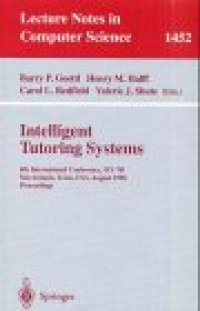
Ebook: Intelligent Tutoring Systems: 4th International Conference, ITS’ 98 San Antonio, Texas, USA, August 16–19, 1998 Proceedings
Author: John R. Anderson (auth.) Barry P. Goettl Henry M. Halff Carol L. Redfield Valerie J. Shute (eds.)
- Genre: Education // International Conferences and Symposiums
- Tags: Artificial Intelligence (incl. Robotics), Computers and Education, Software Engineering, Multimedia Information Systems, Business Information Systems
- Series: Lecture Notes in Computer Science 1452
- Year: 1998
- Publisher: Springer-Verlag Berlin Heidelberg
- Edition: 1
- Language: English
- pdf
The first International Conference on Intelligent Tutoring Systems (ITS) was held ten years ago in Montreal (ITS ’88). It was so well received by the international community that the organizers decided to do it again in Montreal four years later, in 1992, and then again in 1996. ITS ’98 differs from the previous ones in that this is the first time the conference has been held outside of Montreal, and it’s only been two years (not four) since the last one. One interesting aspect of the ITS conferences is that they are not explicitly bound to some organization (e.g., IEEE or AACE). Rather, the founder of these conferences, Claude Frasson, started them as a means to congregate researchers actively involved in the ITS field and provide a forum for presentation and debate of the most currently challenging issues. Thus the unifying theme is science. This year’s “hot topics” differ from those in the earlier ITS conferences as they reflect ever changing trends in ITS research. A few of the issues being examined at ITS ’98 include: Web based tutoring systems, deploying ITS in the real world, tutoring and authoring tools, architectures, and knowledge structure and representation.
This book constitutes the refereed proceedings of the Fourth International Conference on Intelligent Tutoring Systems, ITS'98, held in San Antonio, Texas, USA, in August 1998. The 60 revised full papers presented were carefully reviewed and selected for inclusion in the proceedings. The book is organized in topical sections on architectures for ITS, design and interface issues, tutoring and authoring tools, collaborative learning, knowledge structure and representation, teaching and learning strategies, applications of ITS, student modeling, educational agents, deploying ITS, and Web-based ITS.